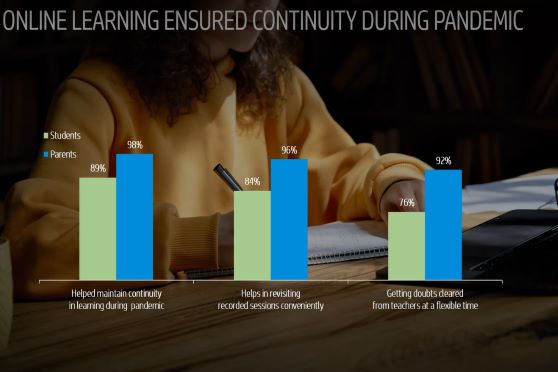Hybrid learning gets a thumbs-up from teachers, students and parents: HP India survey


Hybrid learning is the future, a survey conducted by HP India has proclaimed.
Ketan Patel, managing director, HP India, hosted a virtual meet on ‘Future of Learning Study 2022: Hybrid emerges as the most preferred learning model’ and on January 20 and highlighted the advantages of hybrid learning.
More than 1,500 people comprising 207 teachers aged between 28 and 50 years, 679 parents aged 30 to 60 years and 711 students aged 14 to 22 years were surveyed.
Interviews were conducted across 13 cities, including Delhi, Mumbai, Chennai, Kolkata, Hyderabad, Bengaluru, Lucknow, Chandigarh, Patna, Guwahati, Indore, Ranchi and Kochi.
The HP India Future of Learning Study 2022 found that 98% parents and 99% of teachers surveyed attribute learning continuity to online education. In fact, an overwhelming 91% of students believe that online learning supplements traditional classroom learning.
Most felt the hybrid model ensures learning continuity even in extreme weather conditions. Teachers find that online classes improve work-life balance for them and personal computers are now the most preferred learning device among students, parents and teachers.
The Indian education system witnessed massive disruption because of the pandemic. Technology emerged as a saviour in these challenging times and this influence is evident in learning as well.
The hybrid learning model blends the benefits of online resources and in-person interactions of a traditional classroom setting to enhance the quality of learning. The remarkable shift towards digital learning has enriched student-teacher interactions while also ensuring the safety and comfort of everyone involved. During this transition, students and teachers have also discovered better work-life balance, increased efficiency, and more insight-based instruction delivery. “Backed by The HP India Future of Learning Study 2022, I believe that digital learning is going to play a pivotal role in creating a more efficient and effective hybrid learning model,” Patel said.
Listing the advantages of hybrid learning, Patel said it can reduce learning disruptions because of extreme weather conditions or law-and-order. A blended learning approach also creates more personal time to pursue hobbies and a longer memory retention.